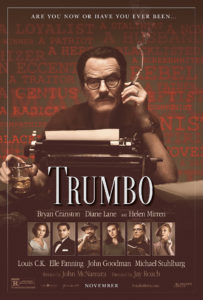 Trumbo is set in Hollywood in the 1940s and 50s during the Red Scare, when the House Un-American Activities Committee (HUAC) was convinced that there were Commie spies planting propaganda in movies, and a lot of once bright careers were destroyed as a blacklist kept them from getting any work. The film centers on Dalton Trumbo, one of the highest paid screenwriters in town who begins the film at the height of his career. But after refusing to testify in front of the HUAC, he’s sent to jail and once released has to find creative ways to continue his craft. Bryan Cranston (Breaking Bad) plays Trumbo, and his Oscar-worthy performance elevates a less than exciting script.
Trumbo is set in Hollywood in the 1940s and 50s during the Red Scare, when the House Un-American Activities Committee (HUAC) was convinced that there were Commie spies planting propaganda in movies, and a lot of once bright careers were destroyed as a blacklist kept them from getting any work. The film centers on Dalton Trumbo, one of the highest paid screenwriters in town who begins the film at the height of his career. But after refusing to testify in front of the HUAC, he’s sent to jail and once released has to find creative ways to continue his craft. Bryan Cranston (Breaking Bad) plays Trumbo, and his Oscar-worthy performance elevates a less than exciting script.
Rather than focus on the politics, which are discussed somewhat in passing, the film takes a personal view of the toll the blacklist has on one man and his family. Trumbo’s wife (Diane Lane) and kids pitch in as he begins a script mill in the house, writing along with his other blacklist buddies under pseudonyms and selling screenplays all over town. There are a couple of scenes with a B-movie producer played by John Goodman that are pretty hilarious, and Trumbo is an articulate and very witty character, but there is a lot that feels lackluster.
Making a movie about famous people is always risky, especially huge screen icons. And the scenes with actors playing famous actors feel false. You can’t act John Wayne or Edward G. Robinson or Kirk Douglas. The one standout among the “real” people is Hedda Hopper (Helen Mirren) and perhaps that’s because she wasn’t so much an icon, as a caricature. Hopper and Wayne were part of a Hollywood lynch mob that bullied the studios to keep the blacklisted artists out. But Robinson was a friend to Trumbo and the rest of the Hollywood 10 (all blacklisted writers), but sold them out when he was called before the committee. The hero of the piece is Kirk Douglas who hires Trumbo, first in secret and then publicly, to (re)write Spartacus.
Trumbo is a sad story of a dark period in America, when fear ran wild and brought out the worst in people. Trumbo won two Oscars for pseudonymous screenplays during his time as a non-entity, so he was not able to claim the honor. The Hollywood blacklist and its power to censor is an important tale to tell, and this is a decent film with some great performances. It’s just too bad that Trumbo wasn’t around to write a better screenplay for his story. I think it is worth seeing, but lower your expectations.

I’m pretty much with Arty Chick on this one. I think Trumbo has some mainstream appeal for anyone who’s into writing, Old Hollywood, and to some extent, not-so-distant American political and cultural history. Cranston’s performance is very good, but I’m not so sure he’s the only actor who could have played the eccentric screenwriter. Same goes for most of the other performances. The most fascinating part of the movie for me is the story itself — and getting a chance to see the absurdity of the times through a singular, personal lens. It’s fun to see old newsreel footage and movie posters — and to realize that Trumbo wrote (but for decades, didn’t get proper credit for) one of my favorite old Hollywood movies, Roman Holiday, with Gregory Peck and Audrey Hepburn. If you missed Trumbo in theaters, go rent Roman Holiday (about a newspaperman who falls for a princess) and then catch Trumbo on demand.